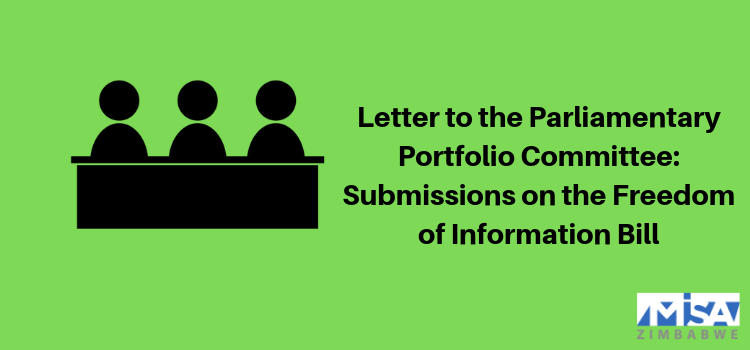8 August 2019
Honourable Prince D. Sibanda
Chairperson of the Parliamentary Portfolio Committee on Information, Media and Broadcasting Services
Parliament Building
Corner Nelson Mandela Avenue and Third Street
Harare
Dear Honourable Sibanda,
RE: MISA ZIMBABWE’S SUBMISSIONS ON THE FREEDOM OF INFORMATION BILL [H.B. 6, 2019]
MISA Zimbabwe, with the support of undersigned freedom of expression organisations from around the globe, in the spirit of constructive engagement and consultations pertaining to the law reform process, respectfully submits our concerns with the recently gazetted Freedom of Information Bill (hereinafter the Bill).
The signatories are concerned that the current version of the Bill does not reflect the provisions of Sections 61 (1) (a) and 62 of the 2013 Constitution, which provides for the right to access to information. At the continental level, the Bill does not currently live up to the Model Law on Access to Information for Africa that provides guidance on the principles of a democratic information law.
Problematic provisions that remain in the current version of the Bill include, but are not limited to:
- Section 6(a) of the Bill protects deliberations and functions of Cabinet and its committees. There is no provision for declassification of information that relates to deliberations and functions of Cabinet and its committees.
- Section 7 of the Bill only deals with access to information held by public entities and is silent on requests from private entities.
- Section 7(1) of the Bill makes no provision for verbal requests for information. Written requests exclude the illiterate and visually impaired.
- Section 8(3) speaks about the form a response will take; the section is not explicit about verbal responses being given in addition to the written responses to requests for information.
- Section 17 of the Bill permits the charging of numerous access to information fees that include search fees, inspection fees, translation fees, copying and printing fees. Multiple fees act as a deterrent to information requests.
- The Bill designates the Zimbabwe Media Commission as the Commission that is responsible for overseeing the implementation of the access to information law.
With these points in mind, MISA Zimbabwe and our co-signatories make the following recommendations to improve the current version of the Bill:
- Expand Section 7 of the Bill to include requests for access to information held by private entities;
- Include a provision for the lodging of verbal requests for information in any of Zimbabwe’s recognised languages, as listed in Section 6 (1) of the Constitution;
- Verbal responses must be given if requested, in addition to a written response to the request for information. The verbal response must be in a local language that the applicant can understand;
- While limited fees are permissible – for example, to purchase stationery necessary to facilitate information requests – the Bill should not permit the charging of stacked repetitive fees, such as search and inspection fees;
- A fixed time period must be reintroduced beyond which records and information relating to deliberations and functions of Cabinet and its committees may be declassified and shared;
- The Zimbabwe Human Rights Commission and not the Zimbabwe Media Commission is the appropriate guardian of human rights in Zimbabwe, including the right to access information. The Zimbabwe Human Rights Commission’s mandate will allow it to interpret the right to access information in a significantly wider context than the ZMC and it should, therefore, be given the task of overseeing the protection and promotion of the right to access information in Zimbabwe.
Yours Sincerely,
Golden Maunganidze
Chairperson
MISA Zimbabwe
CC: Honourable Advocate. Jacob Mudenda, Speaker of the National Assembly.
Signatories in support of this call for reform:
Africa Freedom of Information Centre (AFIC)
Association of Caribbean Media Workers
Asociación por los Derechos Civiles (ADC)
Center for Media Studies & Peace Building (CEMESP)
Center for Media Freedom and Responsibility (CMFR)
Freedom Forum
Free Media Movement
Fundamedios – Andean Foundation for Media Observation and Study
Freedom of Expression Institute (FXI)
Independent Journalism Center (IJC)
International Press Centre (IPC)
Initiative for Freedom of Expression – Turkey
Media Watch
Media Foundation for West Africa (MFWA)
Media Rights Agenda (MRA)
Norwegian PEN
Pacific Islands News Association (PINA)
PEN America
Pakistan Press Foundation
Syrian Center for Media and Freedom of Expression (SCM)
Southeast Asian Press Alliance (SEAPA)
Vigilance for Democracy and the Civic State









